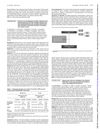 7 citations,
January 2020 in “International Journal of Molecular Sciences”
7 citations,
January 2020 in “International Journal of Molecular Sciences” Low-frequency electromagnetic fields can boost molecules related to hair growth in human skin cells.
 4 citations,
December 2022 in “Advanced science”
4 citations,
December 2022 in “Advanced science” SCD1 is important for hair growth by keeping the connection in skin cells where hair stem cells live stable.
 3 citations,
January 2019 in “International Journal of Trichology”
3 citations,
January 2019 in “International Journal of Trichology” The article concludes that treating hair loss requires careful research, understanding the causes, and personalized treatment plans.
 2 citations,
July 2023 in “Frontiers in Endocrinology”
2 citations,
July 2023 in “Frontiers in Endocrinology” The review found that current care models for PCOS are not fully effective and more research is needed, especially in low-income countries.
 2 citations,
July 2023 in “Life”
2 citations,
July 2023 in “Life” COVID-19 can cause temporary hair loss, which is commonly reversible with treatment.
2 citations,
September 2022 in “Frontiers in Nutrition” High-dose vitamin D3 does not improve symptoms or quality of life in COVID-19 patients after one year.
1 citations,
December 2023 in “Molecules/Molecules online/Molecules annual” JAK inhibitors show promise for treating various skin diseases.
 1 citations,
October 2020 in “Journal of Investigative Dermatology Symposium Proceedings”
1 citations,
October 2020 in “Journal of Investigative Dermatology Symposium Proceedings” The summit concluded that new treatments like Jak inhibitors show promise for Alopecia Areata and personalized approaches are needed.
 1 citations,
January 2018 in “Indian journal of dermatopathology and diagnostic dermatology”
1 citations,
January 2018 in “Indian journal of dermatopathology and diagnostic dermatology” Trichoscopy helps diagnose and monitor hair and scalp problems without needing many biopsies.
 1 citations,
February 2017 in “Journal of pharmacology & clinical research”
1 citations,
February 2017 in “Journal of pharmacology & clinical research” The herbal hair gel with Eclipta alba and Lippia nodiflora extracts was more effective at growing hair than the control gel and minoxidil.
 1 citations,
October 2016 in “Iranian journal of psychiatry and behavioral sciences”
1 citations,
October 2016 in “Iranian journal of psychiatry and behavioral sciences” Sertraline, an antidepressant, may rarely cause hair loss.
 1 citations,
October 2015 in “Journal of endocrinology and diabetes”
1 citations,
October 2015 in “Journal of endocrinology and diabetes” Understanding Polycystic Ovary Syndrome (PCOS) and its causes can lead to effective treatments.
 November 2024 in “Journal of Clinical Medicine”
November 2024 in “Journal of Clinical Medicine” The treatment improved hair thickness, shine, and reduced hair loss effectively.
 November 2024 in “Frontiers in Medicine”
November 2024 in “Frontiers in Medicine” Cirrhosis affects quality of life with various symptoms, requiring a holistic, multidisciplinary approach for management.
 October 2024 in “International Journal of Molecular Sciences”
October 2024 in “International Journal of Molecular Sciences” Rosa rugosa extract promotes hair growth and could be a natural treatment for hair loss.

The study concluded that Frontal fibrosing alopecia can affect younger people, is often missed in men, and may be autoimmune-related.
 January 2023 in “Skin appendage disorders”
January 2023 in “Skin appendage disorders” Low-dose oral minoxidil may help treat hair loss but is not FDA-approved and can cause side effects like unwanted hair growth and heart issues.
 October 2022 in “Springer eBooks”
October 2022 in “Springer eBooks” The document concludes that personalized hormonal treatments are important for transgender individuals and more research is needed for non-binary treatments.
 October 2022 in “IntechOpen eBooks”
October 2022 in “IntechOpen eBooks” Hair loss due to scarring can be treated by reducing inflammation, removing scar tissue, and transplanting hair. The Follicular Unit Extraction technique is effective but requires skill and time. Future focus should be on scar-less healing methods.
 October 2016 in “Iranian journal of psychiatry and behavioral sciences”
October 2016 in “Iranian journal of psychiatry and behavioral sciences” Sertraline, an antidepressant, may cause hair loss in rare cases.
October 2022 in “Our Dermatology Online” The Trust tonic is more effective than minoxidil for treating hair loss.
 3 citations,
January 2012 in “Hanyang Medical Reviews”
3 citations,
January 2012 in “Hanyang Medical Reviews” The document concludes that more research is needed to create suitable diagnostic criteria and understand PCOS in Korean women, and genetics may allow for personalized treatment.
 3 citations,
February 2019 in “Animal biotechnology”
3 citations,
February 2019 in “Animal biotechnology” The PLP2 gene affects cashmere fiber quality in goats and is linked to hair growth and loss.
 3 citations,
January 2021 in “Plastic and Aesthetic Research”
3 citations,
January 2021 in “Plastic and Aesthetic Research” Hair loss reduces hair thickness and coverage, but drug treatments mainly revive dormant hairs rather than reverse thinning; patients often undervalue their hair loss severity.
 83 citations,
May 1999 in “International Journal of Dermatology”
83 citations,
May 1999 in “International Journal of Dermatology” Hair loss that spreads out can often fix itself or be treated by finding and handling the cause.
 1 citations,
October 2021 in “Journal of the European Academy of Dermatology and Venereology”
1 citations,
October 2021 in “Journal of the European Academy of Dermatology and Venereology” The hair lotion reduced hair loss and sped up recovery in women with acute telogen effluvium.
 January 2024 in “Authorea (Authorea)”
January 2024 in “Authorea (Authorea)” Antiepileptic drugs cause cosmetic side effects like hair loss and weight gain, but patients still take their medication without it affecting their quality of life.
 September 2022 in “bioRxiv (Cold Spring Harbor Laboratory)”
September 2022 in “bioRxiv (Cold Spring Harbor Laboratory)” Changing the structure of the hair follicle's environment can affect hair quality but doesn't stop hair growth.
 June 2020 in “Annals of the Rheumatic Diseases”
June 2020 in “Annals of the Rheumatic Diseases” Patients need better information about the risks of long-term steroid use.
 13 citations,
February 2016 in “Clinical Medicine”
13 citations,
February 2016 in “Clinical Medicine” The document concludes that diagnosing and treating hair loss is complex and requires understanding its psychological effects and underlying causes, while also calling for more research and new treatments.


























